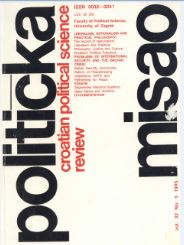Liberalism and Practical Philosophy
Liberalism and Practical Philosophy
Author(s): Ante PažaninContributor(s): Božica Jakovlev (Translator)
Subject(s): Ethics / Practical Philosophy, Political Philosophy
Published by: Fakultet političkih znanosti u Zagrebu
Keywords: liberalism; communitarianism; practical philosophy; John Rawls; Michael Walzer;
Summary/Abstract: The author presents the central postulates from the latest works by John Rawls and Michael Walzer as the most prominent representatives of liberalism and communitarianism in the contemporary American political philosophy and points to their predecessors and parallels in political philosophy; from Kant and Hegel to Mill and Dewey. Since liberals and communitarians of today do not any longer advocate a “society” or a “community” in the traditional sense, but the “posttraditional” liberal-democratic community in which liberal principles of justice and human rights can be realized, their thinking is interesting also to those peoples who have set out to build liberal-democratic societies outside the states of developed West. Naturally, the realization of freedom and human rights depends on the cultural tradition of each people and on the historical “lebensweit” in general, but also on the virtues of liberal citizens who, in a communal political life, realize “postulates of communality comprised in liberalism ” (Walzer) and thus foster a free and good human life.
Journal: Politička Misao
- Issue Year: XXXII/1995
- Issue No: 05
- Page Range: 15-27
- Page Count: 8
- Language: English

